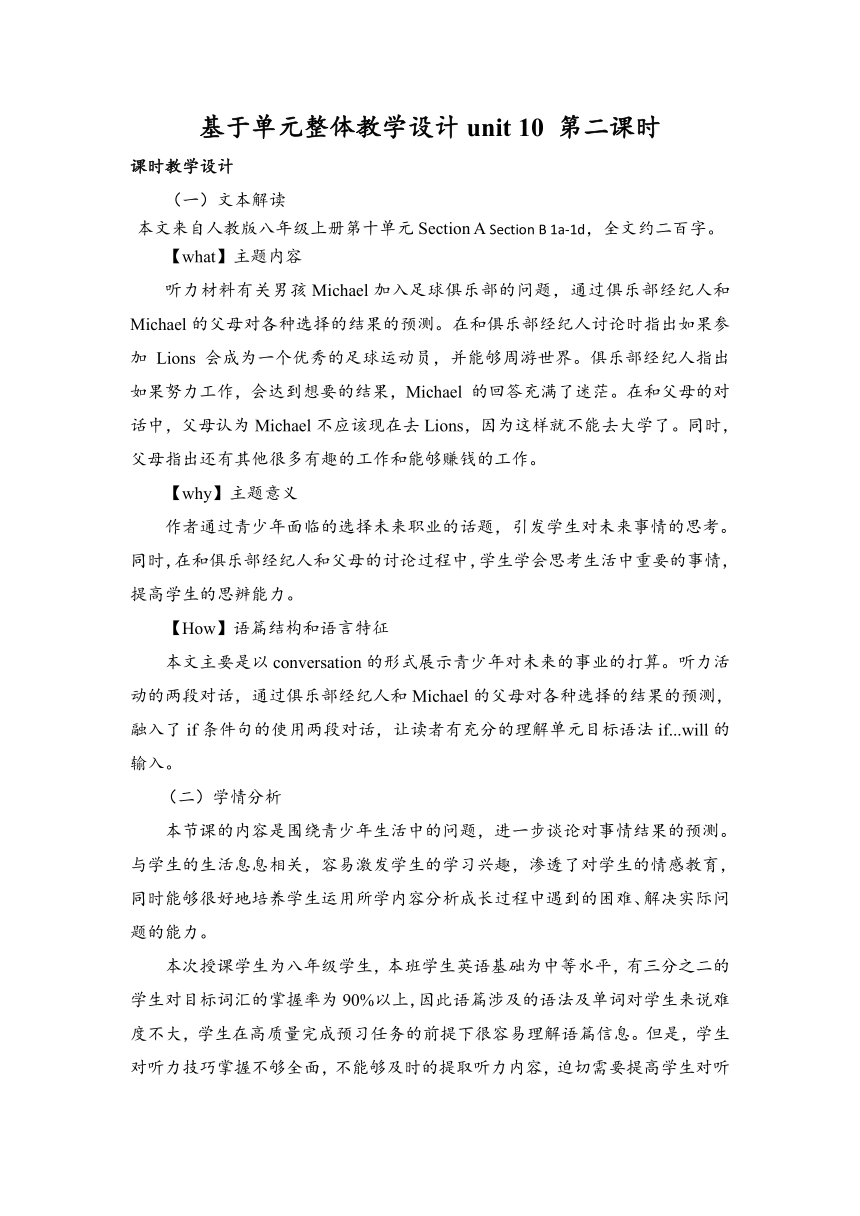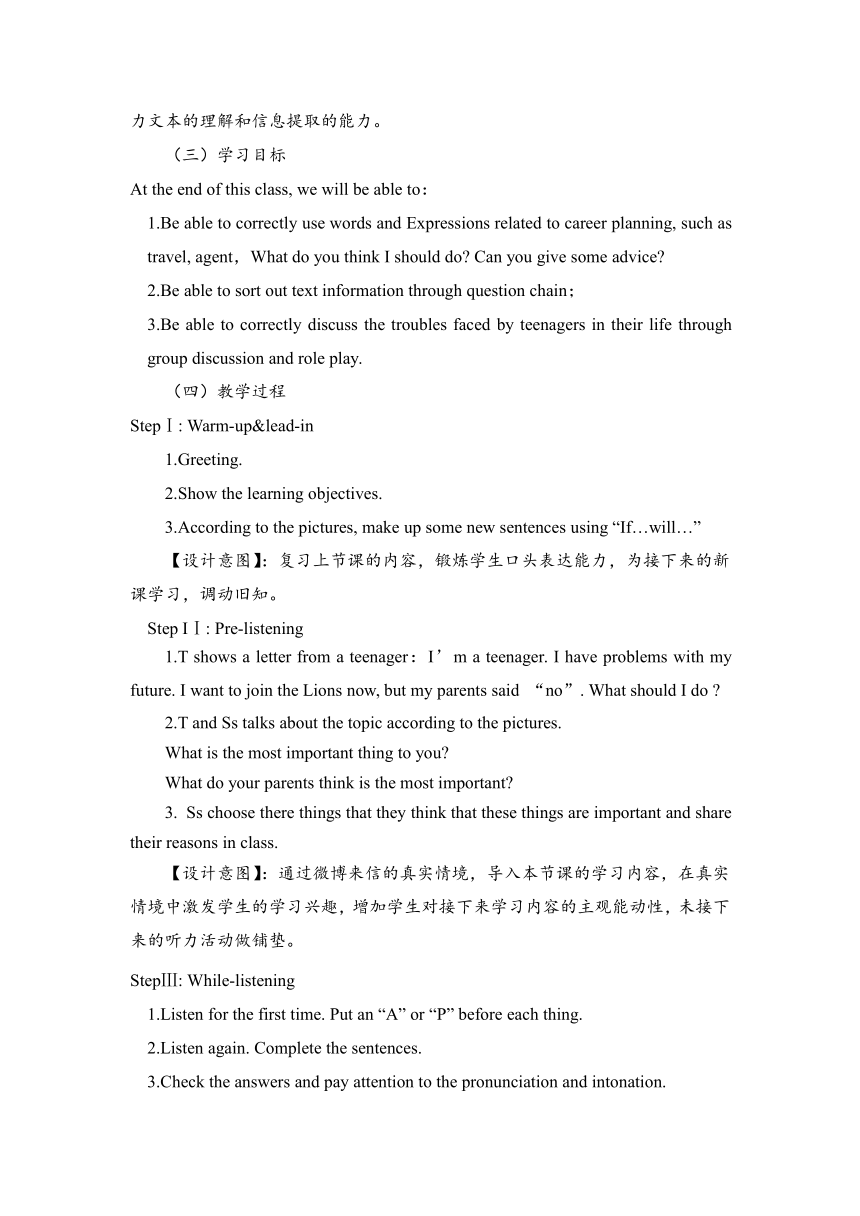【大单元教学】Unit 10 If you go to the party, you’ll have a great time! Section B 1a—1d教学设计
文档属性
| 名称 | 【大单元教学】Unit 10 If you go to the party, you’ll have a great time! Section B 1a—1d教学设计 |

|
|
| 格式 | docx | ||
| 文件大小 | 18.7KB | ||
| 资源类型 | 教案 | ||
| 版本资源 | 人教新目标(Go for it)版 | ||
| 科目 | 英语 | ||
| 更新时间 | 2023-07-15 16:45:11 | ||
图片预览


文档简介
基于单元整体教学设计unit 10 第二课时
课时教学设计
(一)文本解读
本文来自人教版八年级上册第十单元Section A Section B 1a-1d,全文约二百字。
【what】主题内容
听力材料有关男孩Michael加入足球俱乐部的问题,通过俱乐部经纪人和Michael的父母对各种选择的结果的预测。在和俱乐部经纪人讨论时指出如果参加 Lions 会成为一个优秀的足球运动员,并能够周游世界。俱乐部经纪人指出如果努力工作,会达到想要的结果,Michael 的回答充满了迷茫。在和父母的对话中,父母认为Michael不应该现在去Lions,因为这样就不能去大学了。同时,父母指出还有其他很多有趣的工作和能够赚钱的工作。
【why】主题意义
作者通过青少年面临的选择未来职业的话题,引发学生对未来事情的思考。同时,在和俱乐部经纪人和父母的讨论过程中,学生学会思考生活中重要的事情,提高学生的思辨能力。
【How】语篇结构和语言特征
本文主要是以conversation的形式展示青少年对未来的事业的打算。听力活动的两段对话,通过俱乐部经纪人和Michael的父母对各种选择的结果的预测,融入了if条件句的使用两段对话,让读者有充分的理解单元目标语法if...will的输入。
(二)学情分析
本节课的内容是围绕青少年生活中的问题,进一步谈论对事情结果的预测。与学生的生活息息相关,容易激发学生的学习兴趣,渗透了对学生的情感教育,同时能够很好地培养学生运用所学内容分析成长过程中遇到的困难、解决实际问题的能力。
本次授课学生为八年级学生,本班学生英语基础为中等水平,有三分之二的学生对目标词汇的掌握率为90%以上,因此语篇涉及的语法及单词对学生来说难度不大,学生在高质量完成预习任务的前提下很容易理解语篇信息。但是,学生对听力技巧掌握不够全面,不能够及时的提取听力内容,迫切需要提高学生对听力文本的理解和信息提取的能力。
(三)学习目标
At the end of this class, we will be able to:
1.Be able to correctly use words and Expressions related to career planning, such as travel, agent,What do you think I should do Can you give some advice
2.Be able to sort out text information through question chain;
3.Be able to correctly discuss the troubles faced by teenagers in their life through group discussion and role play.
(四)教学过程
StepⅠ: Warm-up&lead-in
1.Greeting.
2.Show the learning objectives.
3.According to the pictures, make up some new sentences using “If…will…”
【设计意图】:复习上节课的内容,锻炼学生口头表达能力,为接下来的新课学习,调动旧知。
Step IⅠ: Pre-listening
1.T shows a letter from a teenager:I’m a teenager. I have problems with my future. I want to join the Lions now, but my parents said “no”. What should I do
2.T and Ss talks about the topic according to the pictures.
What is the most important thing to you
What do your parents think is the most important
Ss choose there things that they think that these things are important and share their reasons in class.
【设计意图】:通过微博来信的真实情境,导入本节课的学习内容,在真实情境中激发学生的学习兴趣,增加学生对接下来学习内容的主观能动性,未接下来的听力活动做铺垫。
StepⅢ: While-listening
1.Listen for the first time. Put an “A” or “P” before each thing.
2.Listen again. Complete the sentences.
3.Check the answers and pay attention to the pronunciation and intonation.
【设计意图】:通过听有关青少年面临的选择未来职业的话题的听力语料,让学生在语境中进一步巩固“If... will...”的使用。
Step Ⅳ: Post-listening
1.Student A is Michael. Student B is his friend. Student B, give student A advice.
A: What do you think I should do Can you give me some advice
B: I think you should go to college.
A: But if I go to college, I’ll never become a great soccer player.
2.Choose a few pairs to act out the conversation.
【设计意图】:通过角色对话的活动,培养学生正确运用if条件状语从句的口语输出能力。
Step Ⅴ: Create and act
1.Ss talk about the the Micheal’s choice in group of 6.
2. Ss share the advice to Micheal.
3.Ss choose the best advice for Micheal.
T: What do you think Michael should do Join the Lions or continue the education Let’s help Megan to give Michael some advice.
I think you should join the Lions. if …., …will…
I think you should continue the education. if …., …will…
【设计意图】:通过教师的引领进一步讨论面对职业所做出的选择,引起学生的进一步深入思考,培养学生的逻辑思维能力。
(五)课时作业设计
Please choose one to finish from the following tasks.
① Collect the phrases related to emotions and events in this unit and write them on the designated notes (no less than 3 groups written by the students themselves), put them into the corresponding boxes, organize the students to draw, and randomly draw 3 groups. According to the extracted notes, randomly invite their partners to play and write dialogues.
(六)课时教学板书设计
Unit 10 If you go to the party, you’ll have a great time! Section B 1a—1d 第2课时
travel agent What do you think I should do Can you give mesome advice
(七)课后反思
本节课环节设计得当,层层递进,教学目标基本达成,注意学生文本分析和信息提取能力的落实,促进学生对阅读技能的掌握;将课本知识与生活紧密相连,使学生能够做到学以致用。课堂的主要优点在于充分利用多媒体,从视觉的冲击入手,开学学生学习视野,激发学生的学习动力,为目标学习做好准备。话题的谈论,贴近学生的生活实际,充分体现了目标语言知识的运用能力。谈论过程也加强了学生的沟通能力和意识,有效的组织学生进行合作学习;课堂所创设的真实语言情景,激发了学生的学习兴趣,通过小组的活动,让学生以主人的身份参与课堂,增加学生的主体地位。
课时教学设计
(一)文本解读
本文来自人教版八年级上册第十单元Section A Section B 1a-1d,全文约二百字。
【what】主题内容
听力材料有关男孩Michael加入足球俱乐部的问题,通过俱乐部经纪人和Michael的父母对各种选择的结果的预测。在和俱乐部经纪人讨论时指出如果参加 Lions 会成为一个优秀的足球运动员,并能够周游世界。俱乐部经纪人指出如果努力工作,会达到想要的结果,Michael 的回答充满了迷茫。在和父母的对话中,父母认为Michael不应该现在去Lions,因为这样就不能去大学了。同时,父母指出还有其他很多有趣的工作和能够赚钱的工作。
【why】主题意义
作者通过青少年面临的选择未来职业的话题,引发学生对未来事情的思考。同时,在和俱乐部经纪人和父母的讨论过程中,学生学会思考生活中重要的事情,提高学生的思辨能力。
【How】语篇结构和语言特征
本文主要是以conversation的形式展示青少年对未来的事业的打算。听力活动的两段对话,通过俱乐部经纪人和Michael的父母对各种选择的结果的预测,融入了if条件句的使用两段对话,让读者有充分的理解单元目标语法if...will的输入。
(二)学情分析
本节课的内容是围绕青少年生活中的问题,进一步谈论对事情结果的预测。与学生的生活息息相关,容易激发学生的学习兴趣,渗透了对学生的情感教育,同时能够很好地培养学生运用所学内容分析成长过程中遇到的困难、解决实际问题的能力。
本次授课学生为八年级学生,本班学生英语基础为中等水平,有三分之二的学生对目标词汇的掌握率为90%以上,因此语篇涉及的语法及单词对学生来说难度不大,学生在高质量完成预习任务的前提下很容易理解语篇信息。但是,学生对听力技巧掌握不够全面,不能够及时的提取听力内容,迫切需要提高学生对听力文本的理解和信息提取的能力。
(三)学习目标
At the end of this class, we will be able to:
1.Be able to correctly use words and Expressions related to career planning, such as travel, agent,What do you think I should do Can you give some advice
2.Be able to sort out text information through question chain;
3.Be able to correctly discuss the troubles faced by teenagers in their life through group discussion and role play.
(四)教学过程
StepⅠ: Warm-up&lead-in
1.Greeting.
2.Show the learning objectives.
3.According to the pictures, make up some new sentences using “If…will…”
【设计意图】:复习上节课的内容,锻炼学生口头表达能力,为接下来的新课学习,调动旧知。
Step IⅠ: Pre-listening
1.T shows a letter from a teenager:I’m a teenager. I have problems with my future. I want to join the Lions now, but my parents said “no”. What should I do
2.T and Ss talks about the topic according to the pictures.
What is the most important thing to you
What do your parents think is the most important
Ss choose there things that they think that these things are important and share their reasons in class.
【设计意图】:通过微博来信的真实情境,导入本节课的学习内容,在真实情境中激发学生的学习兴趣,增加学生对接下来学习内容的主观能动性,未接下来的听力活动做铺垫。
StepⅢ: While-listening
1.Listen for the first time. Put an “A” or “P” before each thing.
2.Listen again. Complete the sentences.
3.Check the answers and pay attention to the pronunciation and intonation.
【设计意图】:通过听有关青少年面临的选择未来职业的话题的听力语料,让学生在语境中进一步巩固“If... will...”的使用。
Step Ⅳ: Post-listening
1.Student A is Michael. Student B is his friend. Student B, give student A advice.
A: What do you think I should do Can you give me some advice
B: I think you should go to college.
A: But if I go to college, I’ll never become a great soccer player.
2.Choose a few pairs to act out the conversation.
【设计意图】:通过角色对话的活动,培养学生正确运用if条件状语从句的口语输出能力。
Step Ⅴ: Create and act
1.Ss talk about the the Micheal’s choice in group of 6.
2. Ss share the advice to Micheal.
3.Ss choose the best advice for Micheal.
T: What do you think Michael should do Join the Lions or continue the education Let’s help Megan to give Michael some advice.
I think you should join the Lions. if …., …will…
I think you should continue the education. if …., …will…
【设计意图】:通过教师的引领进一步讨论面对职业所做出的选择,引起学生的进一步深入思考,培养学生的逻辑思维能力。
(五)课时作业设计
Please choose one to finish from the following tasks.
① Collect the phrases related to emotions and events in this unit and write them on the designated notes (no less than 3 groups written by the students themselves), put them into the corresponding boxes, organize the students to draw, and randomly draw 3 groups. According to the extracted notes, randomly invite their partners to play and write dialogues.
(六)课时教学板书设计
Unit 10 If you go to the party, you’ll have a great time! Section B 1a—1d 第2课时
travel agent What do you think I should do Can you give mesome advice
(七)课后反思
本节课环节设计得当,层层递进,教学目标基本达成,注意学生文本分析和信息提取能力的落实,促进学生对阅读技能的掌握;将课本知识与生活紧密相连,使学生能够做到学以致用。课堂的主要优点在于充分利用多媒体,从视觉的冲击入手,开学学生学习视野,激发学生的学习动力,为目标学习做好准备。话题的谈论,贴近学生的生活实际,充分体现了目标语言知识的运用能力。谈论过程也加强了学生的沟通能力和意识,有效的组织学生进行合作学习;课堂所创设的真实语言情景,激发了学生的学习兴趣,通过小组的活动,让学生以主人的身份参与课堂,增加学生的主体地位。
同课章节目录
- Unit 1 Where did you go on vacation?
- Section A
- Section B
- Unit 2 How often do you exercise?
- Section A
- Section B
- Unit 3 I'm more outgoing than my sister.
- Section A
- Section B
- Unit 4 What's the best movie theater?
- Section A
- Section B
- Unit 5 Do you want to watch a game show?
- Section A
- Section B
- Unit 6 I'm going to study computer science.
- Section A
- Section B
- Unit 7 Will people have robots?
- Section A
- Section B
- Unit 8 How do you make a banana milk shake?
- Section A
- Section B
- Unit 9 Can you come to my party?
- Section A
- Section B
- Unit 10 If you go to the party, you'll have a grea
- Section A
- Section B
